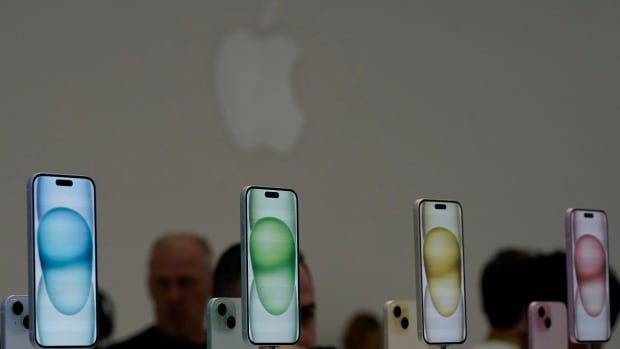The U.S. Justice Department on Thursday announced a sweeping antitrust lawsuit against Apple, accusing the tech giant of “unlawful exclusionary behaviour” by engineering an illegal monopoly in smartphones that boxes out competitors and stifles innovation.
The lawsuit, filed in federal court in New Jersey, alleges that Apple has monopoly power in the smartphone market and uses its control over the iPhone to “engage in a broad, sustained, and illegal course of conduct.”
The lawsuit — which was also filed with attorneys general from 15 states as well as D.C. — takes direct aim at the digital fortress that Apple Inc., based in Cupertino, Calif., has assiduously built around the iPhone and other popular products such as the iPad, Mac and Apple Watch to create what is often referred to as a “walled garden”
Apple has defended the walled garden — meticulously designed hardware and software can seamlessly flourish together while requiring consumers to do little more than turn the devices on — as an indispensable feature prized by consumers who want the best protection available for their personal information. It has described the barrier as a way for the iPhone to distinguish itself from devices running on Google’s Android software, which isn’t as restrictive and is licensed to a wide range of manufacturers.
Antitrust regulators made it clear in their complaint that they see Apple’s walled garden most as a weapon to ward off competition, creating market conditions that enable it to charge higher prices that have propelled its lofty profit margins while stifling innovation.
“Apple undermines apps, products, and services that would otherwise make users less reliant on the iPhone, promote interoperability, and lower costs for consumers and developers,” the Justice Department said in a statement. “Apple exercises its monopoly power to extract more money from consumers, developers, content creators, artists, publishers, small businesses, and merchants, among others.”
“If left unchallenged, Apple will only continue to strengthen its smartphone monopoly,” Attorney General Merrick Garland said at a news conference on Thursday.
Apple called the lawsuit “wrong on the facts and the law” and said it “will vigorously defend against it.”
Justice Department Sues Apple for Monopolizing Smartphone Markets<br><br>🔗: <a href=”https://t.co/sQuqVnTzaX”>https://t.co/sQuqVnTzaX</a> <a href=”https://t.co/9ipWckqfvc”>pic.twitter.com/9ipWckqfvc</a>
—@TheJusticeDept
Tech giants under the microscope
President Joe Biden has called for the Justice Department and the Federal Trade Commission to vigorously enforce antitrust statutes. The administration has already triggered lawsuits against Google and Amazon accusing them in engaging in illegal tactics to thwart competition.
Apple is the world’s most prosperous company, with annual revenue of nearly $400 billion US and, until recently, a market value of more than $3 trillion. Apple’s shares have fallen by seven per cent this year even as most of the stock market has climbed to new highs.
Apple’s business interests are also entangled in the Justice Department’s case against Google, which went to trial last fall and is headed toward final arguments scheduled to begin May 1 in Washington, D.C. In that case, regulators are alleging Google has stymied competition by paying for the rights for its already dominant online search engine to be the automatic place to handle queries on the iPhone and a variety of web browsers in an arrangement that generates an estimated $15 billion to $20 billion annually.
The Justice Department is following up on other recent attempts to force Apple to change the way it runs the iPhone and other parts of its business.
Epic Games, the maker of the popular Fortnite video game, filed an antitrust lawsuit against Apple in 2020 in an effort to break down the barriers protecting the iPhone App Store and a lucrative payment system operating within it. Apple has long collected commissions ranging from 15 per cent to 30 per cent on digital transactions completed within apps, a setup that Epic alleged was enabled by an illegal monopoly that drives up prices for consumers.
B.C. Supreme Court approved a $14.4-million settlement from Apple over a class-action lawsuit accusing it of deliberately providing software updates that slowed iPhone 6 and 7 models.
After a month-long trial in 2021, in which Apple CEO Tim Cook testified, a federal judge ruled mostly in favour of Apple with the exception of deciding that links to competing payment options should be permitted inside of iPhone apps. Apple unsuccessfully resisted that portion of the ruling until the U.S. Supreme Court refused to hear an appeal in January, forcing the company to relent. But the concessions that Apple made to comply with the ruling are still facing a “bad faith” challenge from Epic, which is seeking an April 30 hearing to ask for more changes.
European Union regulators already have vowed to crack down on Apple if it finds the company’s tactics continue to thwart true consumer choice. European regulators slapped a $2 billion US (1.8 billion euro) fine on Apple earlier this month after concluding that the company had undermined competition in the music streaming through the iPhone, despite Spotify being the leader in that market.
In Canada, the B.C. Supreme Court recently approved a $14.4-million settlement from Apple over a class-action lawsuit accusing it of deliberately providing software updates that slowed iPhone 6 and 7 models.


